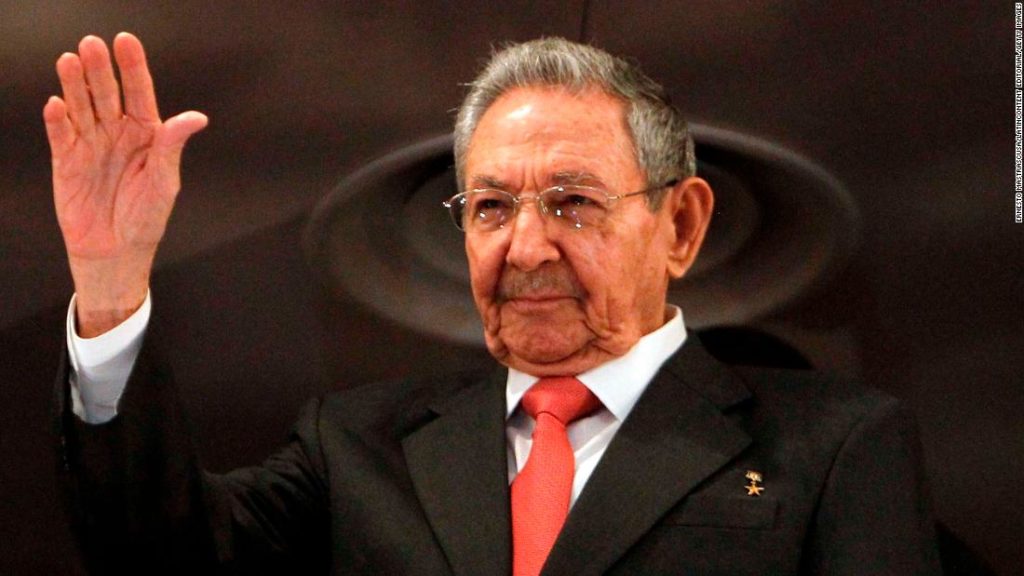Things have not worked out exactly according to Castro’s plan.
As Castro announced he was stepping down on Friday, his country is deep in crisis. The tourism-dependent island has been battered by the pandemic; the economy shrunk at least 11% in 2020 according to government estimates. Cubans each day spend hours in long lines to find increasingly scarce food, medicine and other necessities.
With then-US President Barack Obama, Castro mended long fraught US-Cuban relations, only to see those ties blown up again under the Trump administration which enacted some of the toughest economic penalties on the island in decades.
But so far, current President Joe Biden has been reluctant to engage with the communist-run island despite the most significant change in leadership in Cuba in decades.
“Regardless of what administration we have, Republican or Democrat, it’s a good time to engage,” said former Senator Jeff Flake (R-AZ), a rare member of the GOP to push for improved relations, who met with Raul Castro during frequent trips to Cuba. “It benefits the Cuban people and puts pressure on the Cuban government that they don’t have when we try to isolate them.”
It’s difficult to imagine a more precarious time for the last members of the aging generation that transformed Cuba into a socialist state to finally relax their hold on power.
Despite deepening uncertainty, Cubans witnessed an historic changing of the guard at this week’s 8th Congress for the Cuban Communist Party, “the supreme body” of the only political party permitted on the island.
The congress started Friday, timed to commemorate the 60th anniversary of Cuba’s victory over CIA-trained exiles during the Bay of Pigs invasion.
Even if the outgoing head of the party’s family continues to wield unquestionable power on the island, once the congress is over, no one with the last name Castro will occupy a senior position of leadership for the first time in over 62 years.
Since the early years of the revolution, Cuba’s head of state has always led the party, making it nearly impossible to determine where the government ends and the party begins.
“After that,” Castro said in 2018, “If my health permits it, I will be just one more soldier with the people, defending this revolution.”
His departure brings an end to the era of his famous clan occupying the top leadership on the island. None of the children of Castro’s older brother, Fidel, who died in 2016, hold government posts.
Raul Castro’s son, Alejandro, is a colonel in Cuba’s Interior Ministry and his daughter, Mariela, runs a government center promoting LGBTQ rights. A son-in-law, Gen. Luis Alberto Rodríguez López-Callejas, heads a sprawling military company that controls state-owned hotels, marinas and infrastructure projects but he maintains a low public profile.
Cuba is one of the countries that has changed the least since the end of the Cold War, even as government officials acknowledge the island desperately needs to adapt. Finding the path to modernizing Cuba’s economy will now fall squarely on the shoulders of Miguel Diaz-Canel, Castro’s successor as president who is expected to take over as head of the communist party.
Trained as an electrical engineer, Diaz-Canel ran local governments in two provinces before becoming minister of higher education and then vice president and president.
Diaz-Canel is the first Cuban who was born after the 1959 revolution to become president. Gaining the leadership of the party will further establish the tall, grey-haired technocrat as the political heir to the Castros. But it remains unclear how he differs from his predecessors.
“I believe in continuity,” Díaz-Canel told reporters in 2018 when asked about his vision for Cuba’s future. “I think there always will be continuity.”
Diaz-Canel has tried to project a more active image to the Cuban public, posting on Twitter regularly. He immediately visited the still-smoldering scene of a passenger plane crash in 2018 in Havana that killed 112 people, and he holds cabinet meetings across the island as Fidel Castro used to.
The optics may have changed somewhat but Diaz-Canel is a vocal adherent to the ideology that rigid state control of the economy remains the best way forward for Cuba, despite decades of stagnant economic growth. And any public opposition to the party line, he has said, is the work of Cubans who are “mal nacidos” or born in the wrong country.
Even with all the official talk of maintaining the course, Cuba is changing. Many in Cuba’s nascent private sector complain openly about the slow pace of reforms. Artists fed up with official censorship and activists pushing for legislation protecting animal rights have used increased internet access to organize and publicize small protests that would have been unthinkable just a few years ago.
As Cuba’s government faces increased challenges and threats, some hardliners may be wary of Raul Castro’s exit. But former Senator Jeff Flake told CNN that Castro is likely resist any last-minute appeals to remain.
“He seems a lot more willing to walk into the sunset certainly than his brother did. He would always talk about his grandkids and his family,” Flake said.
“But really to move on, to enact the reforms that Cuba needs, they will need to move well beyond the Castros.”
Correction: An earlier version of this article gave the incorrect year for Fidel Castro’s death. He died in 2016.
You may also like
-
Afghanistan: Civilian casualties hit record high amid US withdrawal, UN says
-
How Taiwan is trying to defend against a cyber ‘World War III’
-
Pandemic travel news this week: Quarantine escapes and airplane disguises
-
Why would anyone trust Brexit Britain again?
-
Black fungus: A second crisis is killing survivors of India’s worst Covid wave

